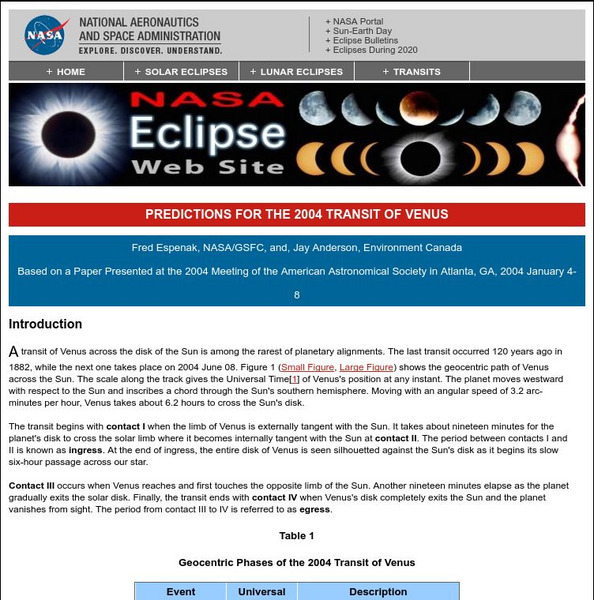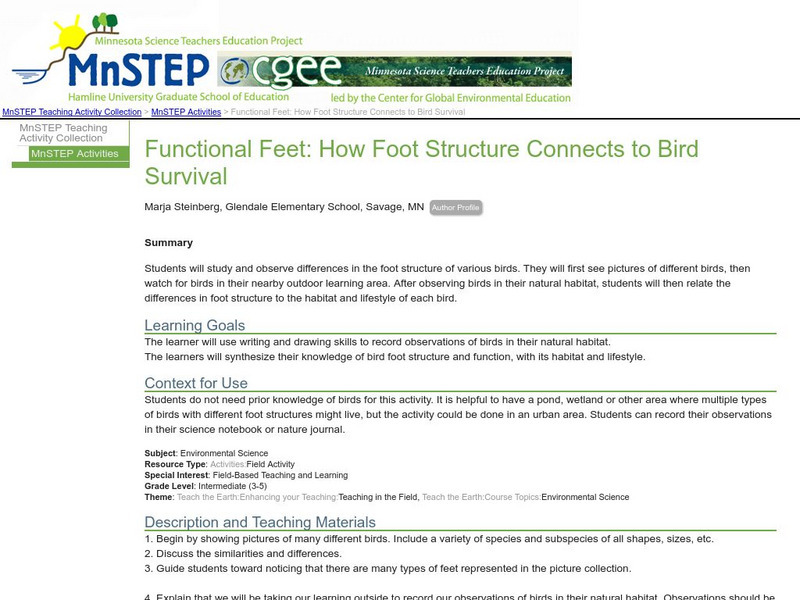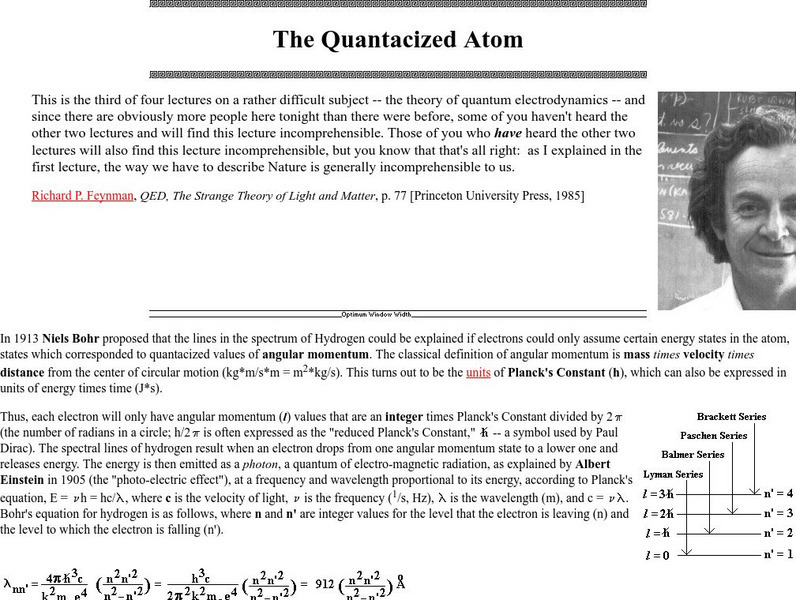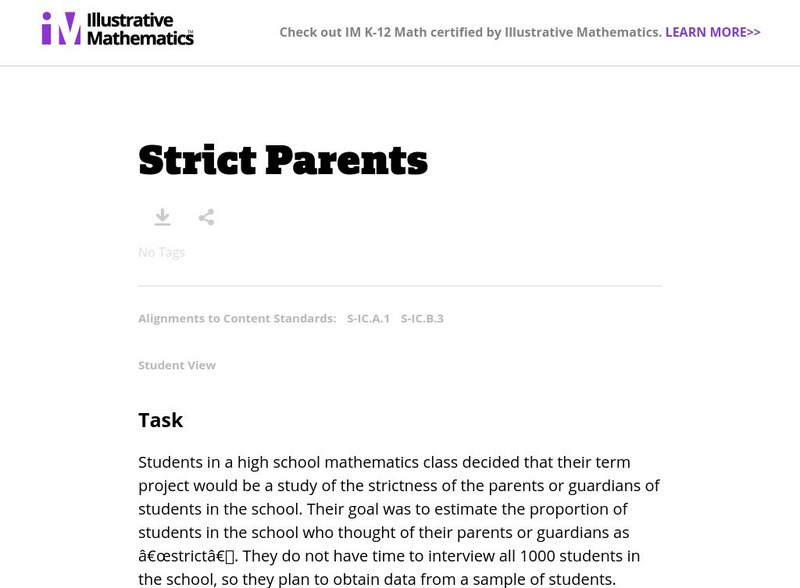PBS
Pbs Learning Media: Observing Refraction of Light
This video segment adapted from Shedding Light on Science illustrates how light changes speed, and thus direction, in a process known as refraction. Includes background reading and discussion questions. [2:05]
Other
Science4 Us: Observing Matter
Students begin to learn the words to describe matter correctly and accurately, learning important skills for communicating scientific information. They will also observe using their senses and scientific tools to measure numerical...
ReadWriteThink
Read Write Think: Book Sorting: Using Observation and Comprehension
Critical thinking, comprehension and analysis skills are the focus of this physical activity. Good beginning to teaching different ways of looking at things.
NASA
Nasa Cosmology: The Study of the Universe
Cosmology is the study of the "large scale properties of the universe as a whole." In this set of sites, NASA provides information on the Big Bang Theory in a simplified language. The beginning, evolution, structure, fluctuations and...
Other
Science4 Us: Science Tools
The Tools module introduces students to the tools scientists use for both qualitative and quantitative observations. Students learn to use tools such as their senses, rulers, and balance scales through hands-on activities.
Smithsonian Institution
Smithsonian Education: Minerals, Crystals, and Gems
Through this series of three lessons, students will gain an understanding of the basics of mineral science. In their investigation they will also work through the scientific process as they practice their observation skills, form...
University of California
University of California at Berkeley: Understanding Science: Poking Around
Students work in groups to develop an understanding of the size and shape of an object hidden beneath a plywood board, asking questions, testing their reasoning, and drawing conclusions, as scientists do. Students are never permitted to...
Better Lesson
Better Lesson: Cornerstone: Peer Review Fishbowl
In this lesson, 6th graders are shown what an effective peer review session looks and sounds like. While observing it, students have a silent discussion online about what they notice. They then fill in a peer review goal setting worksheet.
AdLit
Ad lit.org: Using Technology to Support Struggling Students
Science learning often involves creating abstract representations and models of processes that we are unable to observe with the naked eye. Learn more about visualizing, representing, and modeling to aid struggling learners.
NASA
Nasa: Predictions for the 2004 Transit of Venus
NASA site provides detailed information on the 2004 transit of Venus across the sun. Also explores the modern value of Venus transits and how they aid in the study of astronomy.
Other
The Good News: Would Jesus Keep Easter?
An article discussing the true meaning of Easter and the commercialized version of Easter. Article is from a Christian magazine.
Lumen Learning
Lumen: American and Puritan Literature: Sinners in the Hands of an Angry God
"Sinners in the Hands of an Angry God" is a sermon written by British Colonial Christian theologian Jonathan Edwards, preached to his own congregation in Northampton, Massachusetts to an unknown effect, and again on July 8, 1741, in...
Vision Learning
Visionlearning: Biology: Dna Iii: The Replication of Dna
Instructional module focusing on the discovery and study of DNA replication. Discussion incorporates how scientists were able to observe DNA replication through a technique called DNA synthesis assay. Site also includes an interactive...
Texas Education Agency
Texas Gateway: Heat and Heat Transfer Methods: Conduction
By the end of this section, you will be able to calculate thermal conductivity, observe conduction of heat in collisions, and study thermal conductivities of common substances.
Other
U. Of Wisconsin: Formulating Statistical Questions and Collecting Data
This slideshow gives a detailed explanation of the characteristics of statistical questions and how they differ from other types of questions, the types of studies, and the methods for collecting data. It describes the case of Clever...
Science Education Resource Center at Carleton College
Serc: Functional Feet: How Foot Structure Connects to Bird Survival
Students study and observe differences in the foot structure of various birds by studying pictures, and then observing the birds themselves. After observing birds in their natural habitat, students then relate the differences in foot...
Friesian School
Proceedings of the Friesian School/the Quantacized Atom
A very lengthy page from friesian.com discussing Bohr's theory of electronic energy levels and the explanation of commonly observed atomic emission line spectra. The concept of a photon and Einstein's observation of the photoelectric...
PBS
Pbs Learning Media: The Sun and Planets
Observe the sun and the rotation of the planets in this moving image from NASA. Observe the axial tilts and directional rotation of planets and how they differ for each planet. Be sure to read the background information on how planets...
Illustrative Mathematics
Illustrative Mathematics: S Ic Strict Parents
In this task, students want to estimate the proportion of students in the school who thought of their parents as "strict". They do not have time to interview all 1000 students, so they plan to obtain data from a sample of students....
Other
National Council for the Social Studies: A Picture's Worth
When using historical pictures in the classroom, students will need help drawing their observations together to reach conclusions about the lives of people at a particular time. Sets of photographs - along with probing questions and...
NOAA
Noaa: Be a Shipwreck Detective [Pdf]
Use your skills of investigation to examine a list of items recovered from a shipwreck. Draw conclusions about the ship and its demise based off of your observations.
Global Catholic Network
Catholic Information Network: All About Lent
This site from the Catholic Information Network is a long and detailed discussion of Lent in a question-and-answer format. It attempts to address the major questions associated with observing the Season of Lent for Roman Catholics.
Other
Cometography.com: C/1861 J1 (Great Comet of 1861)
This site provides a detailed discussion of the comet C/1861 J1 (the great comet of 1861). Content includes discovery and observational information, as well as images.
American Geosciences Institute
American Geosciences Institute: Earth Science Week: Exploring Color Maps
An activity where students study the Ozone Hole poster used that brings together colorful images of over 30 years of satellite observations of the ozone hole. Students interpret the color on the globes to see how the ozone hole has...
Other popular searches
- Science Observation Skills
- Observation Skills Ppt
- Observation Skills Nursing
- Observation Skills Forensics
- Tefl Observation Skills
- Observation Skills Pot
- Observation Skills Scince
















